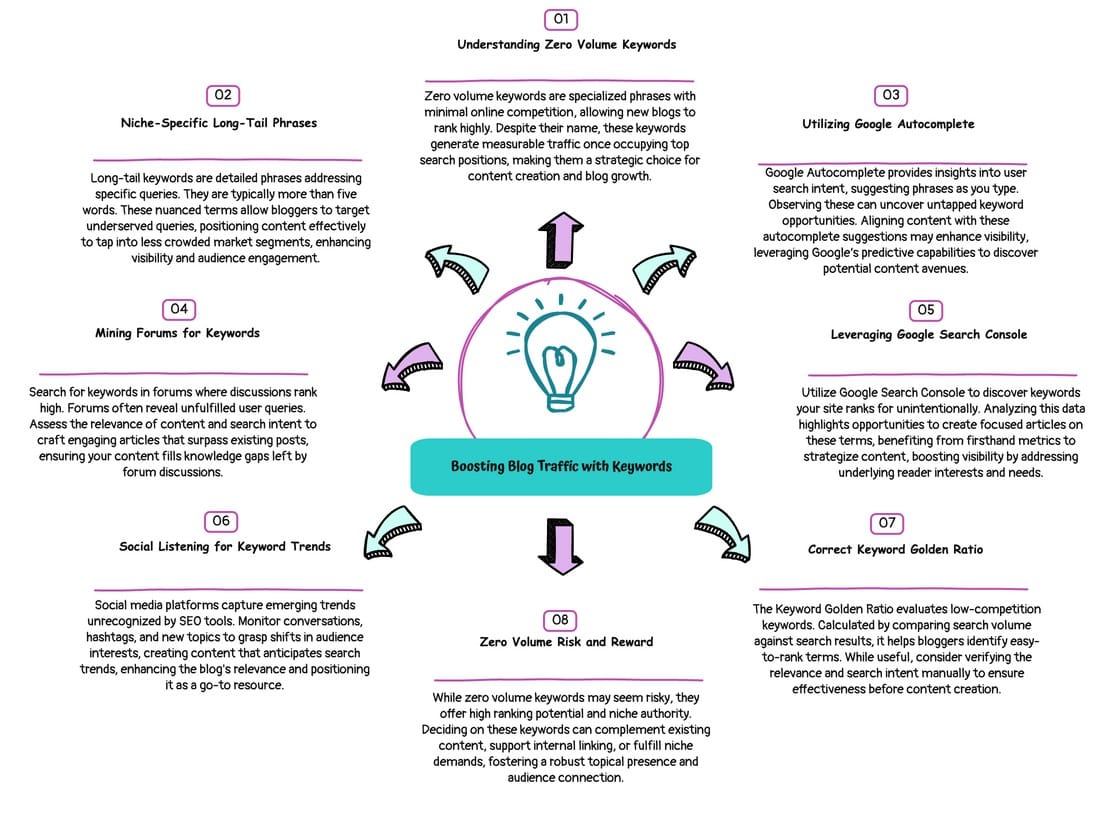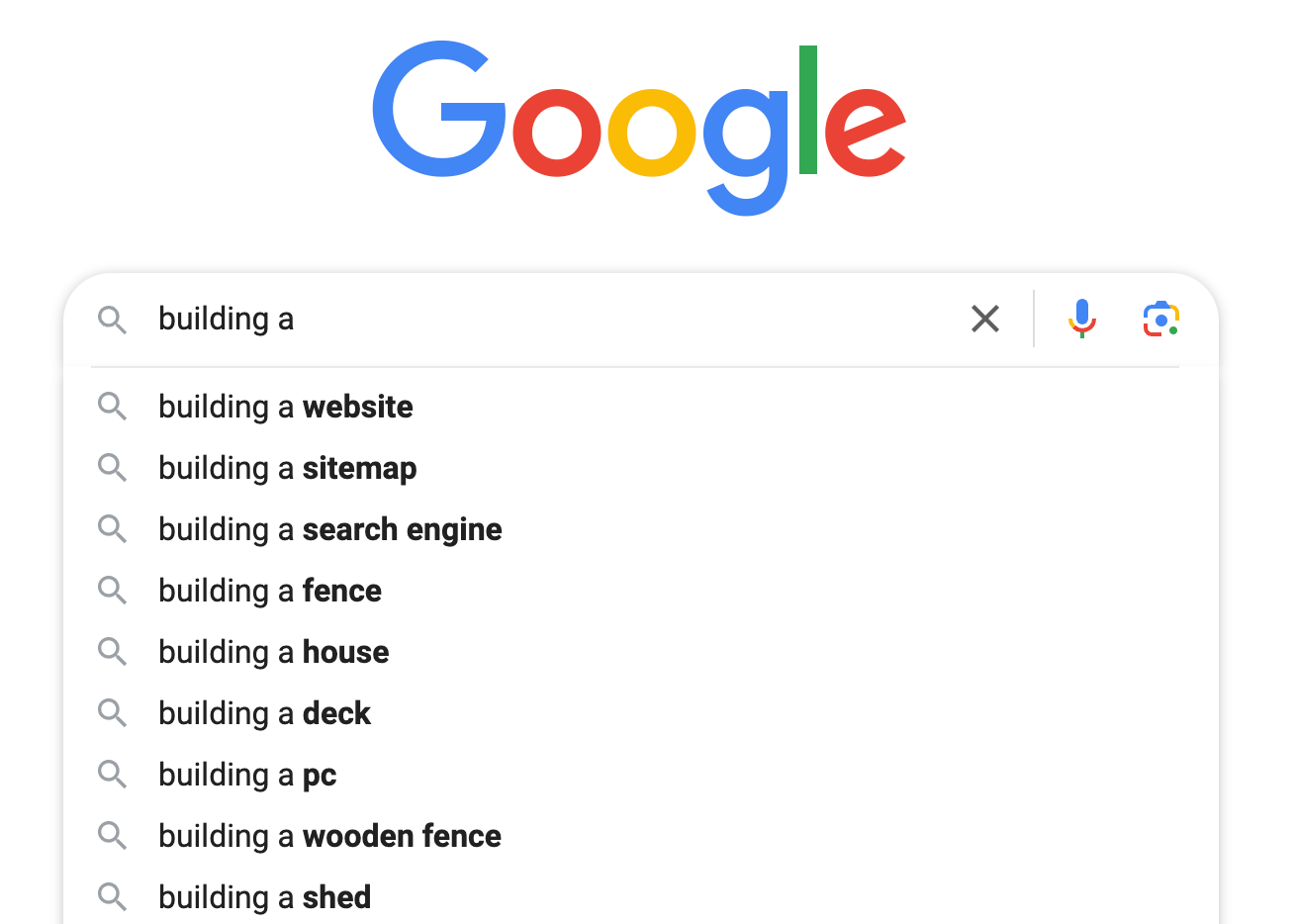One of the best ways for a newer blog to start publishing and growing their traffic is to focus on what are commonly called "zero volume" keywords, these are generally very long tailed (5+ word) phrases that are hyper specific and many times totally unanswered by any resources online.
Many new bloggers target things they want to write and not focusing on the answers people need online, a focus on zero volume keywords can give you a method to slowly accelerate growth in traffic the more you write, using this method helps you to begin this traffic avalanche.
Demystifying Keywords: What is a Zero Volume Keyword?
To be clear from the start, zero volume keywords are NOT actually zero volume.
This fact is the most critical thing you can learn about tools and volume estimation.
Their key benefit is that these zero volume keywords have near zero competition allowing even new sites to rank on page one.
While in the heyday of niche style websites, prior to the August 2023 HCU update, these were keywords that many sites would write on and make insane post counts on their sites, think 10s of thousands, to milk out millions of traffic farming out ultra low competition content that they many times just stole from others.
While "zero volume" is the name most use, due to SEO tools showing them as "0 searches," others have used names to describe similar low competition keywords like "KGR" or "Keyword Golden Ratio" or "zero competition keywords".
The big benefit to these keywords is that your competition will avoid wasting time and effort on them, but these keywords can bring in 1-10k+ clicks depending on the niche and your knowledge of the topic itself.
These long tailed keywords many believe are phrases like "what size backpack to use hiking" but more often than not there needs more quantifiers added. This leads more to a keyword being something like "what size backpack to use hiking in winter."
Beyond Google's Knowledge: Tapping Into Unexplored Searches

There are near 9 billion daily searches and growing on Google alone, this leads to hundreds of thousands to even millions of searches that happen which have never occurred before!
One benefit to being a smaller blogger is the ability to catch some of these new angles before bigger companies can detect them, as most of them rely on tools to choose their keywords.
This is your key to winning and growing within even competitive niches online, you must take advantage of these cracks so you can to get your foot in the door with search engines.
I’m not suggesting you avoid using keyword research tools in the least. But we need to remember they’re all flawed. This is why they’re useful in an SEO strategy, but CANNOT be your entire strategy.
The Art of Finding True Zero Volume Gems
Now remember when I said these aren’t actually “0” volume keywords?
That’s for two reasons:
- They do bring search traffic to your site. I’ve never seen a zero volume keyword bring less than 50 clicks per month from Google when ranking 1st.
- Any keyword having “0” in the volume column of a keyword research tool doesn't mean that it’s a good zero volume keyword.
Overall my first point means they are good to choose to write about because they do bring traffic.
The second point means that you can’t do minimal work and just filter for a “0” search volume on a tool like Keysearch and call it a day.
I’ve definitely written on some that were as low as 0 search volume, but I’ve found others as high as 10,000+ per month. The search traffic shown by any keyword research tool is largely guestimation to determining whether a keyword is zero volume or not.
Instead you MUST do proper research and have a strategy to find these keywords.
Your key to a perfect match is a keyword where the top 10 posts within the SERP don't fulfil the user intent, much of this can only be found by using your eyes and not via a tool.

Navigating the Zero Volume: Key Keyword Categories
To help you streamline your thinking process I’ve outlined below a few of the most common zero volume keywords to help you understand them better. Keep aware that the common thread throughout is that the answers in the SERP don’t serve the user needs.
Harness Google Autocomplete: Your Free Zero Volume Tool
Most users of Google search will know these, when you begin typing into Google search you will begin to also be provided searches they believe you are intending to type out.
This method can be nice when you are starting as it requires no tools and more that you use your eyes and brain to choose one of the autocompleted phrases to see if the top 10 in the SERP matches or fails to help the user.

Many of these once you are over 5+ words will have gaps or nothing in the top 10 actually directed at the user needs, these are what you then want to assemble and publish.
Forum Keywords: Mining UGC for Traffic
These are keywords where forums rank in the top 10 and prior to the HCU update were a key to knowing a well written and quality post could move into their position in the SERP.
Now these are a mixed bag, since that update you now have to think more on these keywords. Many forums now win outright due to Google weighing them as more UGC, or user generated content, and not trying to sell you on something and more function as a discussion on the topic.
Much of this will mean opening the forum and reading all the content to see how well you feel it aligns to the search query and user intent.
keyword Golden Ratio: Competition and Opportunity
Popularized by Doug Cunnington this was more helpful before BERT and other updates from Google as it was a search volume vs ratio of exact inclusion words versus the overall search volume.
In earlier days you could get matches where Google couldn't tell they were the same search, I do provide a free to use Google Sheet if you want to explore this method but make sure to evaluate the wording and always evaluate the SERP.
Another flaw in this is that all keyword research tools aren’t perfectly accurate on volume so using it as part of your math can lead to skewed results.
Leverage Google Search Console: Your Personal Keyword Goldmine
This method is not helpful for a new website as this relies on keywords you can find from your own data within Google Search Console, but as you generate content and rank you can find amazing value.
Your site will often rank for keywords that aren’t relevant to the post they are linked to. But if Google is considering your content for these keywords it means they don’t have anything better matched to put forward to their audience.
So if you were to instead take this keyword and write a dedicated post on the keyword, you can get an easy win and traffic!
Unlike others this will be first party data from Google themselves so its the best option for a realistic understanding of impressions and clicks over any keyword tool.
Social Listening: Uncovering Zero Volume Trends
Social media platforms are goldmines for uncovering zero volume emerging trends that traditional SEO tools will miss. By actively monitoring conversations, hashtags, and emerging topics on platforms like Twitter, Reddit, or niche forums, you can tap into the zeitgeist of your target audience.
These platforms often reveal real-time concerns, questions, and interests that haven't yet registered on search engines.
For instance, a sudden surge in discussions about a specific travel destination or a new hiking gear trend can signal an opportunity to create content around these topics before they become mainstream searches.
By incorporating these social insights into your content strategy, you're not just following trends – you're anticipating them, positioning your blog as a go-to resource for cutting-edge information in your niche.
Zero Volume Risk vs. Reward: Why It's Worth the Gamble
I can tell you that there is always a risk that the keyword could actually be zero volume and yeild no direct searchers, but remember this also should help complement other content on your site so it is valuable for internal linking, social sharing, or similar reuse.
But I’m always going to take the risk for 2 reasons:
- You can still rank highly, and all search engines including Google care about #1 rankings.
- It adds to overall topical authority and helps my expected visitor.
You need to always consider whether you should write on specific keywords, remmeber that just because they may be easy they should also help your intended audience. As with any keyword, it’s vital that it serves your audience as well as fits into your topic silos.
Also they can connect me deeply with my audience as I’m writing posts that focus on their very specific issues. It shows that you really understand their pain points, as well as turns them into Superfans that keep coming back.





